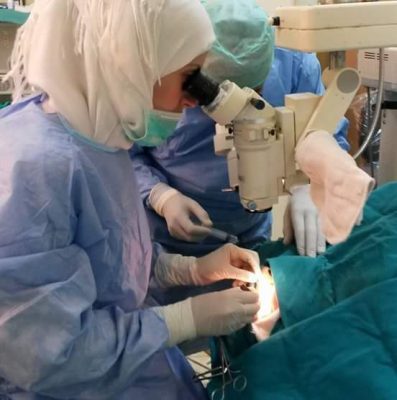Cancer Patients in Opposition Areas Cut Off From Treatment

The operating room in the surgical hospital of Kafr Nabl. Photo by: Razan al-Sayyed.
Abu Thaer makes the long and arduous journey from Maarrat al-Nu’man to Damascus each month to ensure his four-year-old son can get free cancer treatment in a regime hospital.
“My child Ayham has had cancer of the brain for more than a year and I have to take him to Damascus for treatment, said Abu Thaer, 42. “Each time we pass through a regime checkpoint I put myself through danger and the possibility of arrest because I come from an opposition-controlled area.”
As well as the fear of being detained, Abu Thaer said that he and his son faced harassment along the way. The journey was also hard for his sick son.
“All of that is to get my child a free treatment at the al-Bayrouni hospital in Damascus,” he continued. “I don’t have to means to travel with my son to Turkey or any other country, so I only have Damascus as an option.”
“Why aren’t there cancer centres in opposition areas?” Abu Thaer asked. “We really need them, even if only one centre.”
People suffering from cancer in opposition-held areas have few options when it comes to seeking treatment.
Zaher, a general surgeon, said that hospitals in the Idlib countryside, as in all other liberated areas, could simply not treat cancer patients due to the lack of radiation equipment and specialist doctors.
“The number of cancer patients has significantly increased recently and is now up to ten per cent [of the population] compared to it four to five percent before the revolution,” the
38 year-old continued. “Because of the lack of services, survival rates for the disease are falling, while the reverse could happen if the patient was able to detect the illness early and receive the necessary treatment. That’s when the possibility of successful treatment increases to 90 per cent.”
Zaher said that lung cancer was the most common form of the disease in men in the Idlib countryside, while breast cancer was most widespread among women. He also described a rise in colon cancer among both sexes.
Salwa, 40, has suffered from cancer for a long time, but her illness wasn’t discovered until shortly after her condition worsened, she said.
“I was suffering from ulcerative colitis and treated it with regular anti-inflammatory drugs, but recently I had bleeding and complications and after doing tests, discovered that I had advanced stage cancer,” said Salwa, 40. She needs intensive treatment immediately to fight the disease and so has no choice but to travel to Damascus.
Her doctor, Ahmed, said, “We lack facilities to diagnose cancer in our areas, so when we suspect the presence of a malignant tumour we take a biopsy and send it to Damascus, this process takes more than a month.”
The 52 year-old emphasised that early detection was key to the success of cancer treatment, although in cases such as Salwa’s, symptoms may only appear when the disease has reached an advanced stage.
Alia, 41, is suffering from breast cancer but is too afraid to travel to Damascus for treatment, fearing that her husband, son or brother might be arrested if they accompany her.
She had surgery a few years ago, but it did not eradicate the disease completely. So she is using her savings to buy expensive medicine.
“I had some properties which I sold in order so I could get treatment,” she said. “Each dose costs me 250 US dollars and I need a treatment every two weeks.”
Alia gets her medication from her pharmacist, Ahmed, who said that it was difficult to come by.
“Cancer drugs are available in only one pharmacy in all of Aleppo, Lattakia and Damascus and since they are very expensive, I reserve them for those who can pay for them and for their transportation,” the 35-year-old said. “Less fortunate patients have no option but to wait for their turn to get free medicine from the hospital in Damascus or to resort to traditional treatments which may not work.”
Abu Mohammed, a 56 year-old elder in Maarratt al-Nu’man who sits on the local council, said that he could not understand why so little had been done to help cancer patients in opposition areas.
Abu Mohammed said he was afraid the numbers of people suffering from cancer would rise due to the long-term impact of conflict, especial given rampant environmental pollution.
He concluded, “I have no words to describe the trials of these cancer patients.”
